Rev. Clay Evans was quite a guy. The founder of Fellowship Baptist Church, located at 4543 South Princeton Avenue, passed quietly at his home on Thanksgiving Eve surrounded by family. He was a member of what news anchor Tom Brokaw called “The Greatest Generation.”
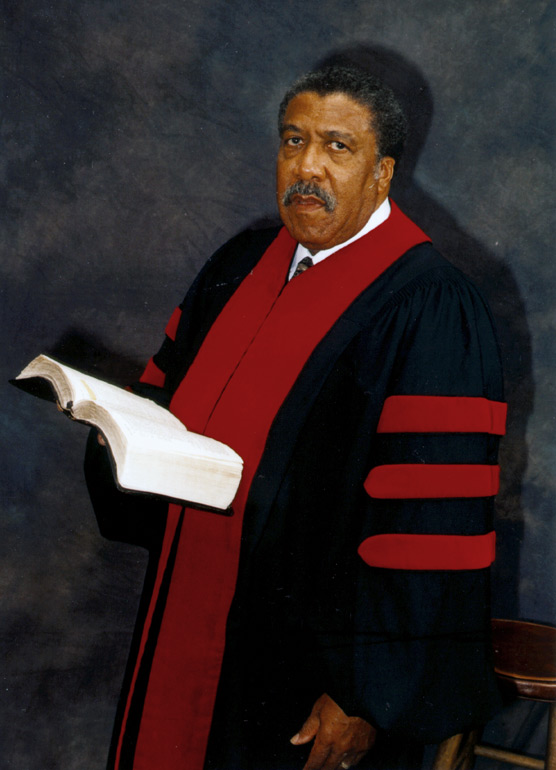
(1925-2019)
Rev. Evans had said good-bye to many and he prepared many for his departure, but no matter how prepared, you are never really ready. Rev. Evans had previously planned his funeral with exactness and precision. He turned over his papers to the Harold Washington Library and told everybody beyond the grief and tears to get the job done as he detailed it. He laid out a plan.
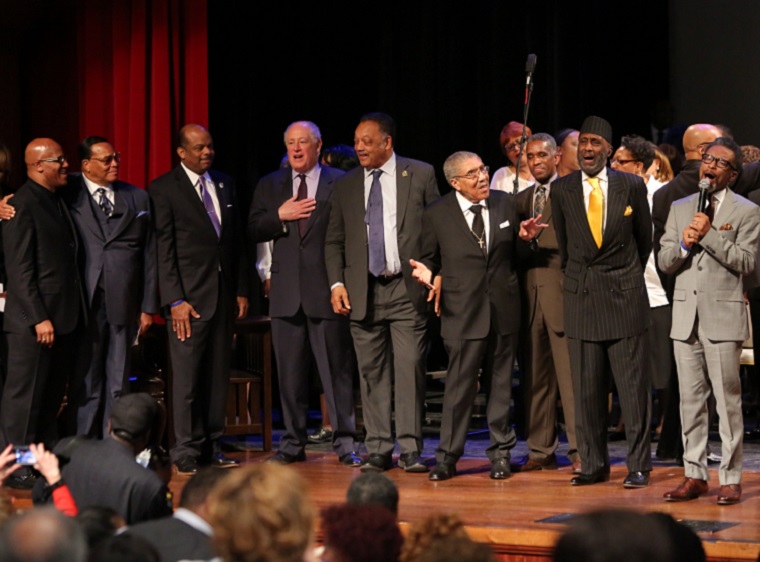
The Reverend Dr. Clay Evans came to Chicago from Brownsville, Tennessee in the Jim Crow south. He was a southern gentleman. He and Tina Turner came from the same town, he liked to tell you.
As a young teen, Clay and a friend walked the streets and didn’t get off the sidewalk for white men and stared them down, which caused his parents to fear for his life, as it was the custom in those days for Black people to step off the sidewalk to make way for white folk. Such an action could get you lynched.
Evans arrived in Chicago in June of 1945 ready to go to school for mortuary science, but he did not have the tuition. As a laborer, he realized he could sing when he worked in the Brass Rail Lounge and thought he could be a big band singer. But he became a minister instead and started his church in a garage.
He took that church from a meager membership to a very solid one. He called it a ship, a fellowship. He sang gospel and traveled the country with his message and his raspy, bluesy, gospel voice that led what became one of America’s top gospel choirs. His sister, Mrs. Loudella Evans Reed, was the musical guru. The voice of Sam Cook came from Rev. Evans’ church choir.

The Daley Factor
The southern sidewalk situation was the beginning of Clay’s life’s work of standing up with conviction, courage and principal. Evans was never one to back down and he sometimes paid the price for his conviction.
While he was on his way to building a new church edifice with a loan already in place, Mayor Richard J. Daley halted the project because Evans was one of few ministers who welcomed Dr. Martin Luther King into his pulpit when he came to Chicago.
Daley ordered the six Black Chicago aldermen to rebuff King and Black ministers not to let King in their churches, as he was an unwelcomed voice in Chicago. Daley flatly and firmly said King’s civil rights were not needed in Chicago.
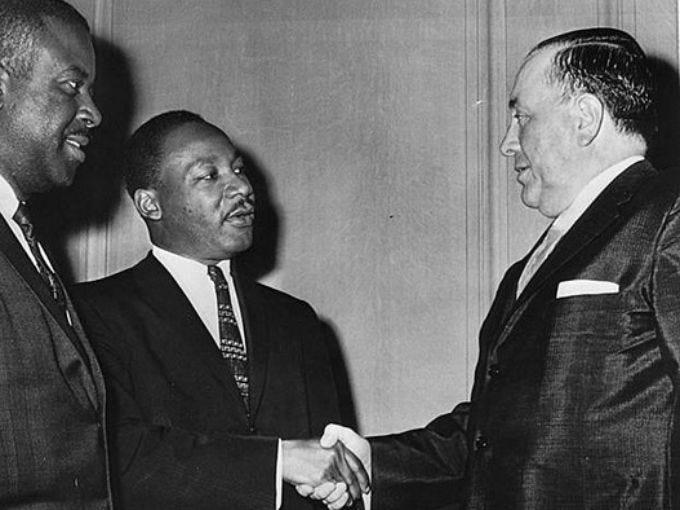
Evans disagreed. When King came to fight poor education in Chicago schools with the Willis Wagons, and slumlords in housing, most notably on the West Side, Evans was firm in accepting King to preach in his church. So Daley’s punishment was to stop the building of Clay’s church.
Rev. Evans took a political hit and became Daley’s example of what could happen if you defied him. Daley exemplified racism at its finest in the Chicago way, but what Daley didn’t see was a new politic in Chicago being born.
Evans’ fledgling new church stood for seven years with only a steel frame. My ex-husband, David Wallace, and I often would go by and pray at that spot. David saw and understood the powerful symbolism as he talked about the Walls of Jericho. As a young couple, we went there often to sit and pray. The church, the new church, was eventually built.
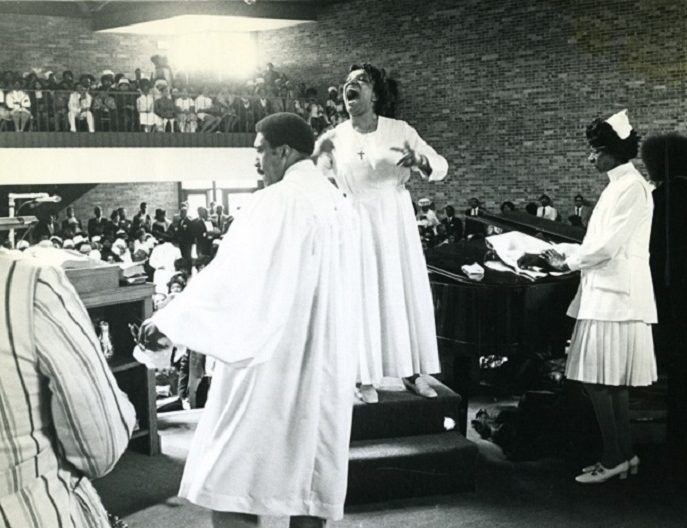
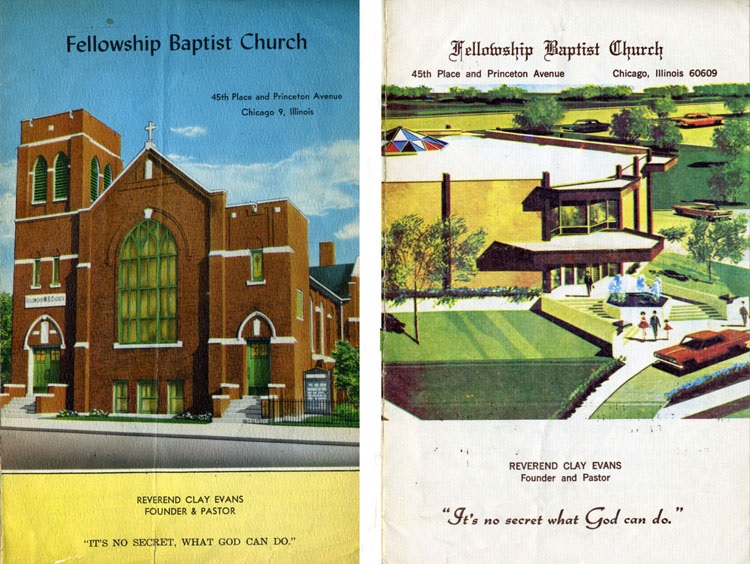
Rev. Evans and Mayor Richard M. Daley became friends, as the younger Daley made amends for his father’s actions, in addition to realizing that he was better off with Rev. Clay Evans than not. With the help of Chuck Bowen, Daley’s civic engagement staffer, a real ministerial alliance was formed and it was powerful and effective.
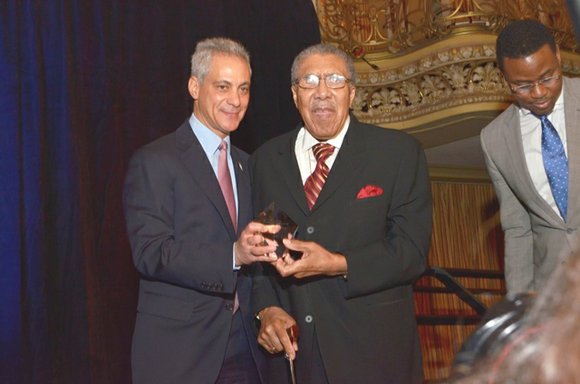
“With strong character, you have something that no one can ever have. It belongs only to you, and no one can ever remove it.” – Rev Clay Evans, N’DIGO interview by Wanda Wright, December 12, 1996
The Jesse Factor
Rev. Evans become known for his conviction, integrity and firmness and was steadfast in his belief. He stood tall and he made ministers a political force in this city under his leadership.
Eventually, the politicians, from presidential candidates to aldermen, came to Evans for his blessings as they ran for office. Clay spoke directly, with an unwavering voice about the Black community. He was more powerful than any elected official. He got things done.
The Reverend Jesse Jackson, then a young minister at the Chicago Theological Seminary, was ordained at Fellowship in 1968 and was the assistant minister at the church. A little known fact is that he also signed the loan for the church.
Rev. Evans became the chair in the formation of Jackson’s Operation Breadbasket as it became Operation PUSH and Evans was a key supporter of Jackson’s presidential campaigns in 1984 and 1988.
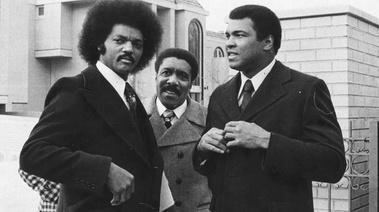
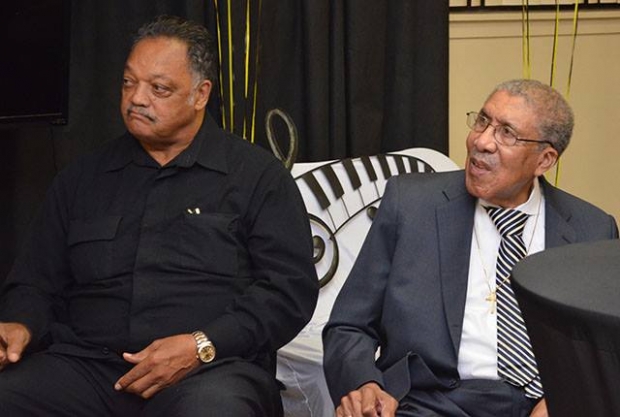
Evans and Jackson became powerhouses together and their duo ministry was dynamic. Evans provided counsel to Jackson all the way. In the early Breadbasket years, we held leadership-training classes and worker council meetings on Friday evenings at the church.
These meetings were intended as leadership training for a new generation. These were organizing meetings. Evans often said the church is the hub for everything; it all starts in the church. He was right.
For me, as I was in my college years, it was another collegiate class with real learning in real time where I met people who became life-long friends as we discussed politics, entrepreneurship, and strategies and methods to improve the Black community.
Developing Leadership
Clay Evans was a mentor to many and an incredible leader. He assisted so many and was ahead of his time. Before it was popular for women to wear a collar, he ordained Mother Consuela York, the first female to the ordained in the Baptist denomination in Chicago.
Rev. Evans was single-handedly responsible for at least 500 people being in the ministry; some say the number is probably closer to a thousand. When he chaired the McCormick Theological Seminary African American Partnership on the campus of the University of Chicago from 1992 to 2000, 115 ministers received advanced degrees in the ministry and theology.
Clay was one of the first ministers to broadcast on both TV and radio, which provided him with a national platform. He realized early the impact of media and communications.
As he ordained and trained, his support was advocacy, supporting new churches, finding churches for new ministers, and helping to retire ministers. He helped them all, from building congregations to annual events to membership to sermons. He was of counsel to many in real time on real issues.
Grooming A Successor
After 50 years of active ministry, Rev. Evans retired from his daily activities at Fellowship, leaving a rich legacy. Clay had become the authority figure, the Godfather in so many ways. He said half a century was long enough and had groomed a successor in the Reverend Charles Jenkins.
Clay wanted someone to be the same age as he was when he started the church, he wanted a firebrand preacher, he wanted a singer, and he wanted an organizer. That was Charles Jenkins.

Evans chose Jenkins and trained him beyond the seminary. He was in meetings and conferences and introduced to mentors and worked with many for years before he took the reigns. Evans called many of his ministerial colleagues to come to Fellowship to observe Jenkins in the pulpit. He wanted their thoughts on his manner and delivery and presentation.
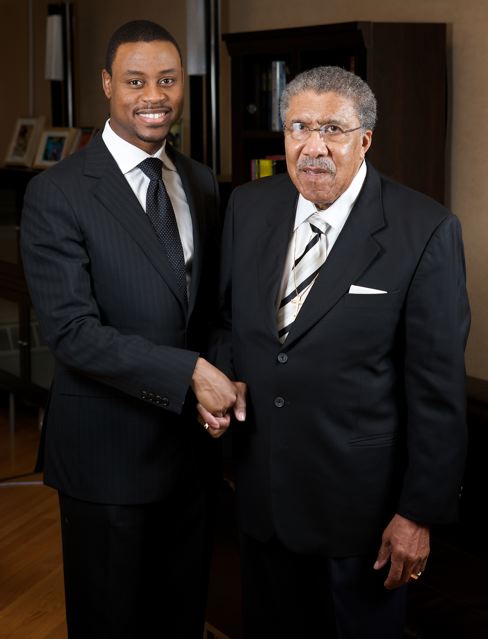
Evans listened. Jenkins listened. They got it right. He schooled Jenkins with introductions to who’s who and established relationships within proven networks. But he also realized that Jenkins would make his own way.
Clay trained his successor as he did many, for leadership, not just ministry. He trained with practical insight and reality. That was Clay’s beauty – he was not high and mighty and beyond, but practical with homespun advice to his friends, his ministers, and his parishioners.
He knew people had to eat and work and provide for their families. He helped many of them. He also knew people made mistakes, from the political players to the average John Doe.
The N’DIGO Factor
When I started N’DIGO, I showed Rev. Evans the paper and asked if I could deliver it to his church for Sunday services. I explained to him that it was more important for me to be in the churches than on the news stands.
He agreed and asked how much was it. I told him it was free, which it was; we didn’t charge for N’DIGO. But Clay said no, he would pay for the papers. And he did for a long while.

Another time I went to him to talk about the N’DIGO GALA and how I was giving out scholarships. He said he want a scholarship given in his name, but he wanted it go to a “C” student. He said C students are forgotten about, but often become great leaders. He told me the A and B students will find their way. He told me to look for the underdog and that became the Evans Scholarship.
He knew real leadership and led from the ground. He knew what it took. He knew how to bring people together to discuss an issue and to come up with a solution. He often asked what do you need. He knew how to execute, he knew how to put people in their proper places, and he knew and taught how to operate.
Rev. Evans was a minister’s minister and a leader’s leader. He will be missed for his wisdom and council. He conquered his world. He rose to the top. He stood up to the powerful and they came to pay respect and kiss the ring, if you will, right there on 45th and Princeton.
Betty Magness, a long time Fellowship parishioner, recalls once when we were protesting at CBS-TV for its lack of Black programing and faces on air, we had planned for certain ministers to get arrested. After the young ministers were placed in the paddy wagon, Rev. Evans insisted that he be arrested as well.
He literally arrested himself, because the police wouldn’t. He thought the young ministers were a tad young to make the real point. So he willingly went to the jail cell, with them, to keep the protest on track.

Evans paid his respect to this city by doing the right thing and he paid the political consequence if necessary. He didn’t seek the limelight, instead he sought the right thing to do and he did it and stood by it. He was a behind the scenes guy not grabbing for the microphone as he pushed others forward.
Rev. Clay Evans lived a long life of 94 years. He was productive, he shared, he taught, he counseled, he saw Jim Crow die, he saw Chicago change, he saw his dream come true, he saw his successor grow to become what he wanted him to be, and even retire from the pulpit. He was fulfilled. He was married to his childhood sweetheart, Lutha Mae Hollinshed, for 74 years and together they had five children.
Though Rev. Evans is already missed, his legacy provided for the next three generations to follow with leadership qualities and, for some, he passed on ministerial duties. He was a man among men who enjoyed his role. He leaves us with great sorrow, but “my, my,” as he would say, what a life.
Reverend Clay Evans was always woke.



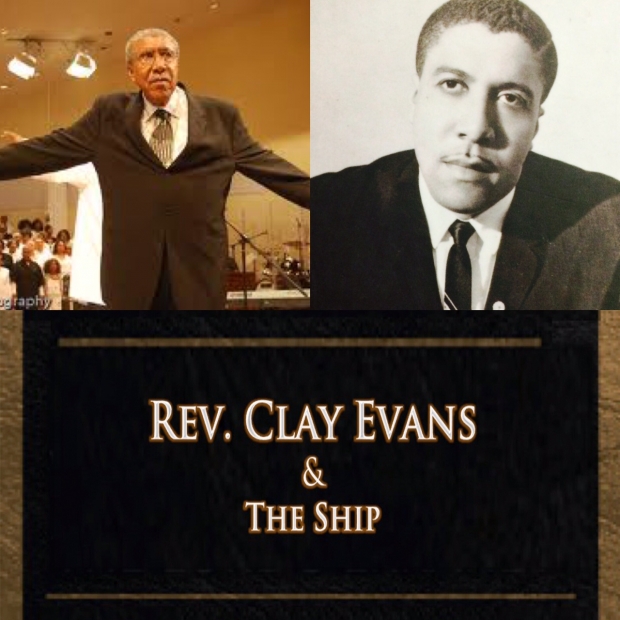



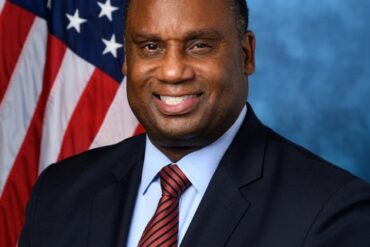
I loved this article. Thank you for sharing your experiences with Pastor Evans.